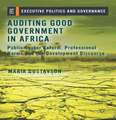Leveraging Financial Markets for Development: How KfW Revolutionized Development Finance: Executive Politics and Governance
Autor Peter Volberdingen Limba Engleză Paperback – 30 sep 2021
| Toate formatele și edițiile | Preț | Express |
|---|---|---|
| Paperback (1) | 387.75 lei 6-8 săpt. | |
| Springer International Publishing – 30 sep 2021 | 387.75 lei 6-8 săpt. | |
| Hardback (1) | 392.60 lei 6-8 săpt. | |
| Springer International Publishing – 29 sep 2020 | 392.60 lei 6-8 săpt. |
Preț: 387.75 lei
Nou
Puncte Express: 582
Preț estimativ în valută:
74.19€ • 77.69$ • 61.54£
74.19€ • 77.69$ • 61.54£
Carte tipărită la comandă
Livrare economică 09-23 aprilie
Preluare comenzi: 021 569.72.76
Specificații
ISBN-13: 9783030550103
ISBN-10: 3030550109
Pagini: 285
Ilustrații: XXIII, 285 p. 2 illus.
Dimensiuni: 148 x 210 mm
Greutate: 0.41 kg
Ediția:1st ed. 2021
Editura: Springer International Publishing
Colecția Palgrave Macmillan
Seria Executive Politics and Governance
Locul publicării:Cham, Switzerland
ISBN-10: 3030550109
Pagini: 285
Ilustrații: XXIII, 285 p. 2 illus.
Dimensiuni: 148 x 210 mm
Greutate: 0.41 kg
Ediția:1st ed. 2021
Editura: Springer International Publishing
Colecția Palgrave Macmillan
Seria Executive Politics and Governance
Locul publicării:Cham, Switzerland
Cuprins
Chapter 1. The Marketization of Development Finance.- Chapter 2. 1950-1970: The World Bank, DFCs, and the Foundations of Private Investment Mobilization.- Chapter 3. 1970 to 1990: Development Finance in Crisis and the Search for a New Paradigm.- Chapter 4. KfW and the Early Stages of Marketized Development Financial Instruments. Chapter 5. Chapter 5: The Maturation of Marketized Development Financial Instruments: Microfinance and Structured Funds.- Chapter 6. The Scaling-Up of Marketized Development Financial Instruments from 2005 to 2017.- Chapter 7. Conclusion and Future Directions.
Notă biografică
Peter Volberding received his PhD from the Government Department at Harvard University, USA. His research focuses on the intersection between public institutions and private financial markets, and is co-author of a forthcoming edited volume on European development banking. He currently lives and works as a consultant in New York City.
Textul de pe ultima copertă
“This is an excellent book on an increasingly important topic, and proves a valuable resource for academics, students, and policy-makers.”
—Stephany Griffith-Jones, Professor, Columbia University, USA
“Peter Volberding addresses a long-standing issue of delivering effective financing for sustainable economic development. He does not simply provide the origin, evolution and challenges of marketized development financial instruments, he goes beyond!”
—Désiré Kanga, Centre for Global Finance, SOAS University of London, UK
“Peter Volberding’s engaging account documents the actors and institutions—notably, the German state-owned KfW—that made this revolutionary change possible.”
—Beth Simmons, Professor, University of Pennsylvania, USA
This book investigates how development institutions created and promoted marketized development financial instruments to increase the speed and scope of assistance by leveraging private financial markets for development objectives. To attract private investors, donor governments agreed to bear the risk in these new instruments in order to mobilize investment during times of political crisis. In particular, this book contends that Germany’s KfW played an outsized role in the development of these new financial instruments, particularly in microfinance banks and structured funds, as KfW’s unique institutional attributes and strong political support from the German government at critical junctures fostered financial innovation. Using over 70 interviews and a cache of newly released archival materials, this book documents how KfW and other development institutions created and promoted these marketized development financial instruments, and how they have become a pillar of modern development policy. Peter Volberding received his PhD from the Government Department at Harvard University, USA.
—Stephany Griffith-Jones, Professor, Columbia University, USA
“Peter Volberding addresses a long-standing issue of delivering effective financing for sustainable economic development. He does not simply provide the origin, evolution and challenges of marketized development financial instruments, he goes beyond!”
—Désiré Kanga, Centre for Global Finance, SOAS University of London, UK
“Peter Volberding’s engaging account documents the actors and institutions—notably, the German state-owned KfW—that made this revolutionary change possible.”
—Beth Simmons, Professor, University of Pennsylvania, USA
This book investigates how development institutions created and promoted marketized development financial instruments to increase the speed and scope of assistance by leveraging private financial markets for development objectives. To attract private investors, donor governments agreed to bear the risk in these new instruments in order to mobilize investment during times of political crisis. In particular, this book contends that Germany’s KfW played an outsized role in the development of these new financial instruments, particularly in microfinance banks and structured funds, as KfW’s unique institutional attributes and strong political support from the German government at critical junctures fostered financial innovation. Using over 70 interviews and a cache of newly released archival materials, this book documents how KfW and other development institutions created and promoted these marketized development financial instruments, and how they have become a pillar of modern development policy. Peter Volberding received his PhD from the Government Department at Harvard University, USA.
Caracteristici
Argues that development institutions, and most notably Germany’s KfW, have been at the forefront of integrating development policy with private financial markets Develops a synthesized framework to understand why development institutions have mobilized private finance, and why donor governments have been willing to absorb the risk in new financial instruments Provides the only independent scholarship of KfW and its role in global development finance, and documents other under-researched areas within development, including national development banks and World Bank-sponsored development finance companies














